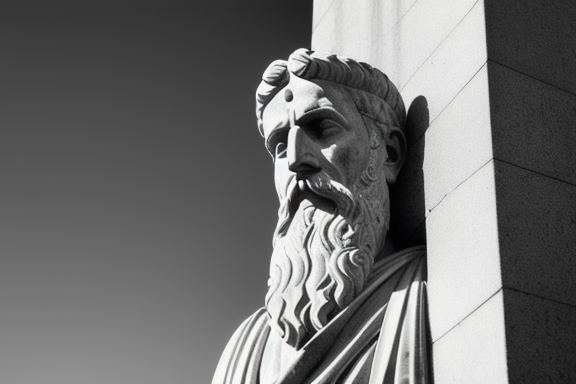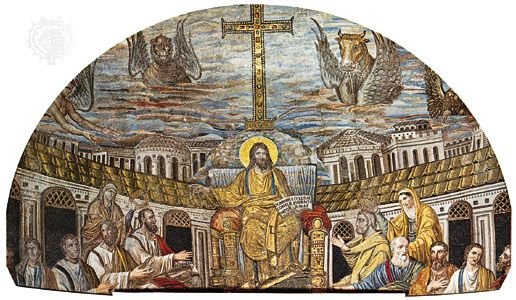Stoicism is a school of philosophy that originated in ancient Greece around the 3rd century BCE. It was founded by Zeno of Citium and emphasizes the development of virtue, self-control, and inner calm in the face of adversity. Stoics believe that one’s happiness and well-being depend on how they respond to external events, rather than the events themselves.
Jesus, on the other hand, is the central figure of Christianity and is revered by millions around the world. He is believed to be the Son of God and the savior of humanity. Jesus’ teachings, as recorded in the Bible, focus on love, compassion, forgiveness, and the pursuit of righteousness. His message emphasizes the importance of faith, humility, and living a life of service to others.
While Stoicism and Jesus’ teachings may appear to be different, there are intriguing similarities that suggest a potential connection between the two. Both philosophies emphasize the importance of inner transformation, self-control, and the development of virtuous character traits. They also encourage individuals to focus on what they can control and to accept and endure the inevitable challenges of life.
Additionally, both Stoicism and Jesus’ teachings offer guidance on how to navigate relationships and interact with others. Stoicism teaches the importance of treating others with kindness and empathy, while Jesus’ teachings emphasize the Golden Rule of treating others as you would like to be treated.
Exploring the potential overlap between Stoicism and Jesus’ teachings can provide valuable insights and a deeper understanding of both philosophies. It can shed light on how individuals can cultivate inner peace, develop resilience, and live a life of integrity and compassion.

The Stoic Principles and Their Relation to Jesus’ Teachings
Stoicism is a philosophical school of thought that emerged in ancient Greece and later became influential in the Roman Empire. At its core, Stoicism emphasizes the importance of virtue, self-control, and acceptance of fate. The Stoic principles provide a practical framework for living a good and meaningful life.
One of the central tenets of Stoicism is the distinction between things that are within our control and those that are not. Stoics believe that we should focus our energy and attention on what we can control, such as our thoughts, actions, and attitudes, rather than wasting time and effort on external circumstances beyond our influence. This resonates with Jesus’ teachings, particularly his emphasis on personal responsibility and inner transformation.
Another principle of Stoicism is the notion of living in accordance with nature. Stoics believe that everything in the universe is interconnected and that we should align our actions with the natural order of things. This includes accepting the inevitable ups and downs of life and finding contentment in the present moment. Jesus also spoke about the importance of living in harmony with God’s creation, teaching his followers to trust in God’s providence and to seek first the kingdom of God.
Stoicism places great emphasis on the development of moral character and virtue. Stoics strive to cultivate qualities such as wisdom, courage, justice, and temperance. These virtues are seen as essential for leading a virtuous and fulfilled life. Similarly, Jesus’ teachings emphasize the importance of moral character and virtues such as love, compassion, humility, and forgiveness. Both Stoicism and Jesus‘ teachings encourage individuals to strive for moral excellence and to live in accordance with ethical principles.
While Stoicism and Jesus’ teachings share some similarities, it is important to note that they also have distinct differences. Stoicism is a philosophical system rooted in reason and naturalistic principles, whereas Jesus’ teachings are grounded in faith and spiritual beliefs. However, the commonalities between Stoic principles and Jesus’ teachings highlight the universal values of virtue, self-control, acceptance, and moral character that resonate across different philosophical and religious traditions.
Jesus as a Stoic
It is fascinating to explore the possible influence of Stoicism on Jesus’ teachings and to discover the similarities between Stoic philosophy and Jesus’ own philosophy. While there is no direct evidence to suggest that Jesus was a Stoic, many scholars have identified Stoic principles and ideas in his teachings. These connections offer valuable insights into the depth and wisdom of Jesus’ message.
Evidence of Stoic Influence in Jesus’ Teachings
**One of the key Stoic principles that can be seen in Jesus‘ teachings is the concept of inner peace and tranquility**. Stoicism emphasizes the importance of finding serenity within oneself and not being swayed by external circumstances. Similarly, Jesus often spoke about finding peace in the midst of trials and tribulations, teaching his followers to trust in God and have faith even in the face of adversity.
**Another Stoic idea that aligns with Jesus’ teachings is the importance of virtue and moral character**. Stoicism teaches that the highest good is to live a virtuous life, characterized by wisdom, courage, justice, and self-control. Jesus also emphasized the significance of moral character, teaching his followers to love their neighbors, forgive their enemies, and live with integrity.
Similarities between Stoicism and Jesus’ Philosophy
**Both Stoicism and Jesus’ teachings emphasize the power of the mind in shaping one’s perception of the world**. Stoicism teaches that our thoughts and judgments determine our emotions and reactions to external events. Similarly, Jesus spoke about the importance of having a renewed mind and focusing on positive and uplifting thoughts.
**Another similarity between Stoicism and Jesus’ philosophy is the emphasis on living in accordance with nature or God’s will**. Stoicism teaches that we should align our actions with the natural order of the universe, accepting what cannot be changed and focusing on what is within our control. Jesus echoed this sentiment when he taught his disciples to seek God’s kingdom and follow God’s will above all else.
**Furthermore, both Stoicism and Jesus’ teachings emphasize the importance of selflessness and service to others**. Stoic philosophers believed that true happiness and fulfillment come from contributing to the well-being of society. Jesus exemplified this principle through his teachings on love, compassion, and serving others, even to the point of sacrificing his own life.
While it is important to note that Jesus’ message goes beyond Stoic philosophy and encompasses unique aspects of his own divine nature, it is fascinating to recognize the parallels between Stoicism and Jesus’ teachings. These similarities offer valuable insights into the universal principles of wisdom, virtue, peace, and love that transcend cultural and philosophical boundaries.
Conclusion
After exploring the evidence of stoic influence in Jesus’ teachings and examining the similarities between stoicism and Jesus’ philosophy, it becomes clear that there is a strong connection between the two. While it is impossible to definitively prove that Jesus was a stoic, the parallels in their teachings and values suggest a significant influence.
Recap of the main points:
- Stoicism, a philosophy that emphasizes virtue, self-control, and acceptance of one’s fate, aligns closely with Jesus’ teachings on morality, personal conduct, and surrender to God’s will.
- Both Stoicism and Jesus’ philosophy emphasize the importance of inner transformation, focusing on character development and the cultivation of virtues like compassion, humility, and forgiveness.
- Jesus often used parables and metaphors to convey his teachings, just like the stoics employed allegories and anecdotes to illustrate their philosophical concepts.
- Stoic concepts such as the dichotomy of control, the pursuit of tranquility, and the practice of self-examination resonate with Jesus’ teachings on surrendering to God, finding peace in faith, and examining oneself for spiritual growth.
While the Stoic philosophy was prevalent in the Greco-Roman world during Jesus’ time, it is important to note that Jesus’ teachings were not limited to any one specific philosophical school. His message was unique and transcended cultural and philosophical boundaries.
Final thoughts on the topic:
Exploring the potential influence of stoicism on Jesus’ teachings offers us a deeper understanding of his message and the cultural context in which he lived. It provides insights into the similarities between different philosophies and religions, highlighting the universal values they share.
While Jesus’ teachings encompassed a wide range of moral, ethical, and spiritual principles, the overlap with stoicism invites us to reflect on the timeless wisdom that both philosophies offer. Whether Jesus was directly influenced by stoicism or not, the shared emphasis on virtue, self-control, and inner transformation serves as a reminder of the importance of these values in our own lives.

Rockin’ the faith, one verse at a time!
Growing up, the Bible’s stories deeply impacted me. Now, with over 15 years of preaching experience, I blend timeless teachings with modern technology, making them relevant for today’s world.
Bible Hub Verse is my platform to share historical insights and thought-provoking articles, exploring both familiar and uncommon Christian topics. My passion is building a welcoming online space for everyone to learn, grow in their faith, and discover the Bible’s enduring message.
Join the journey!
God bless you.






